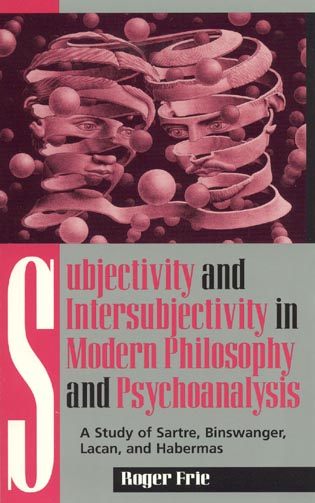Books
Wounds of Silence: Legacies of Genocide and Racial Violence (Oxford University Press, forthcoming)
What does it mean to pursue the comfort of daily life alongside legacies of profound injustice? What are the ethical demands that histories of atrocity place on us, even if we did not participate in them? These are the kind of questions that lay at the heart of this book, which explores the nature of silencing, accountability, and the obligations we have to each other as individuals and as a society. Award winning author and psychoanalyst Roger Frie travels to sites of atrocity and meets with descendants of survivors and perpetrators of the Holocaust in Germany, the Indigenous genocide in Canada, and the legacy of lynching in the United States. Wounds of Silence melds survivor testimony, history, and personal reflection with a wealth of illustrations and psychological insights. The stories and lessons that the author shares will remain with readers long after they have finished. This book is essential reading for anyone who wants to understand what is involved in confronting silence and indifference, engaging in reparative acts of memory, and working toward racial justice in the present. At a time when governments use silencing to quell dissent and dictate how the past is remembered, this book serves as a warning, a plea for tolerance, and a recognition of human rights. [The provisional book cover image shows St. Mary’s Indian Residential School, which is located to the east of Vancouver, Canada.]
Anticipated publication date of late 2026
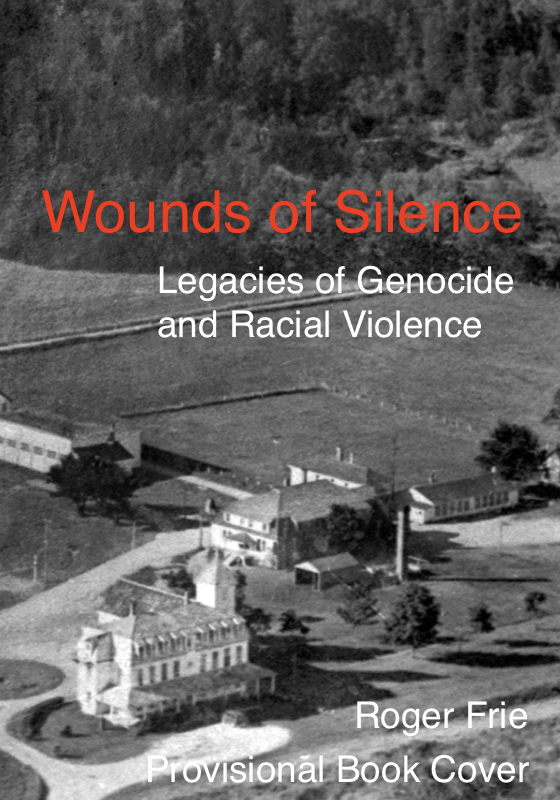
Edge of Catastrophe: Erich Fromm, Fascism and the Holocaust (Oxford University Press, 2024)
- “Highly recommended.” — Choice
- Finalist for the 2025 Western Canada Jewish Book Award
Erich Fromm, the prominent twentieth-century public intellectual and psychoanalyst, was recognized for his courageous stand against fascism, racism, and human destructiveness. Until now, however, little has been known about the extent to which Fromm’s personal experience of Nazi Germany and the Holocaust shaped his outlook and work. In Edge of Catastrophe, Roger Frie introduces the unpublished Holocaust correspondence in Fromm’s family. In the aftermath of the genocide, Fromm returned again and again to the themes of responsibility, social justice, and human solidarity, yet without revealing his own experience. As this book powerfully shows, Fromm’s social, political, and psychological writings take on new meaning in light of the traumas and tragedies that he and his family experienced. The image of Fromm that emerges enriches our understanding of what it means to be both a social critic and practicing psychologist. In light of the racial hatreds we see today, Frie demonstrates that a politics of engagement and a psychology of well-being go hand in hand. There is much to be learned from the urgency in Fromm’s writings as we seek to respond to the social crises and the renewed threat of fascism in our present age. [A German translation is forthcoming in 2027 with Psychosozial-Verlag.]
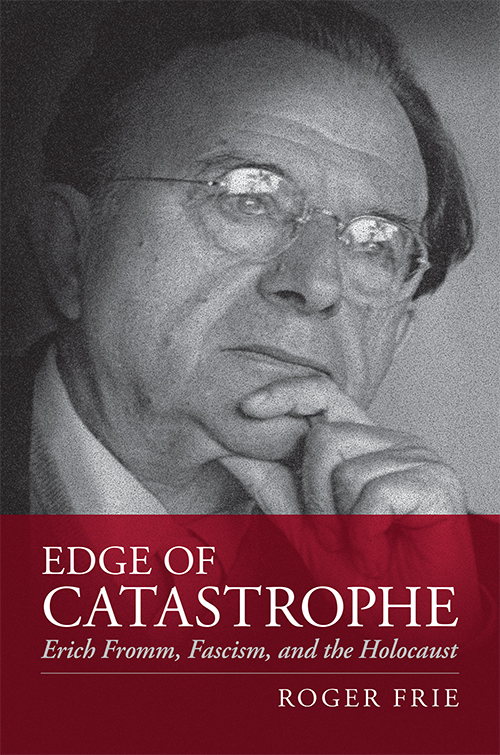
Culture, Politics and Race in the Making of Interpersonal Psychoanalysis: Breaking Boundaries (Routledge, 2022)
- Winner of the 2023 American Board & Academy of Psychoanalysis Book Prize
Psychotherapists today are grappling with how to address a host of societal and political crises. In the 1930s, a similar set of crises led a group of progressive clinicians and scholars to engage in a radical, cross-disciplinary dialogue. Pioneering psychoanalysts created a form of thought and practice that viewed human suffering through the wider lens of society and culture and provided a means to address the pervasive issues of racism, sexuality and politics in human experience. With contributions from leading psychoanalysts and scholars, and by making use of original sources, Culture, Politics and Race in the Making of Interpersonal Psychoanalysis demonstrates the significance of the early interpersonal-cultural school approach to understanding our present moment. Editors, Roger Frie and Pascal Sauvayre, have created an important book that will appeal to a broad audience in psychoanalysis and psychotherapy, the history of medicine, and social and cultural theory.
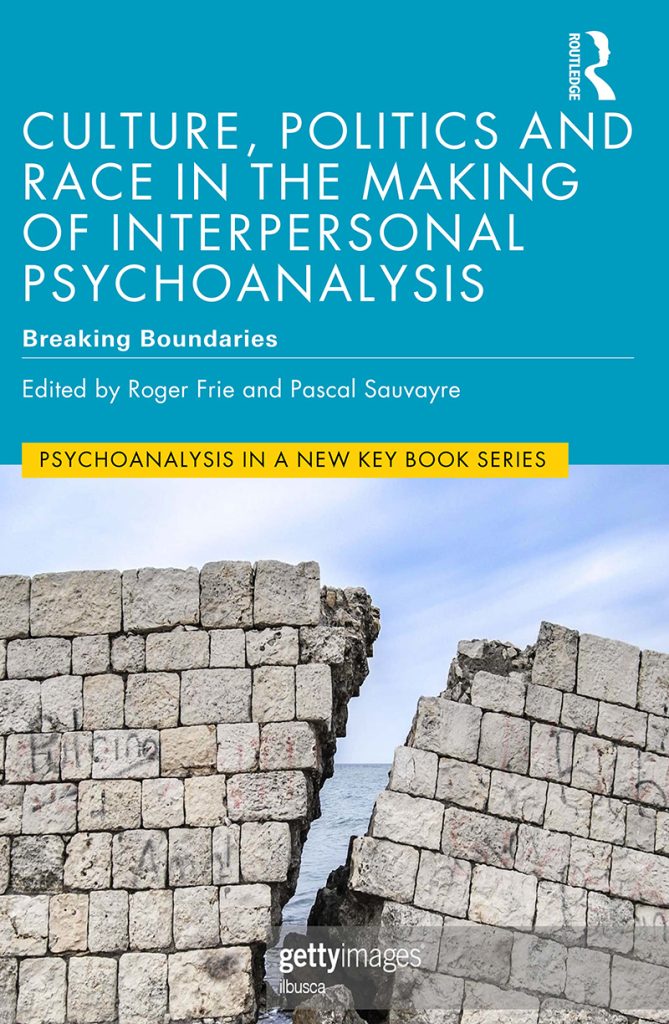
Nicht in meiner Familie, Deutsches Erinnern und Verantwortung nach dem Holocaust (Brandes & Apsel, 2021)
A new, expanded German edition of the award-winning book, Not in My Family: German Memory and Responsibility after the Holocaust. Nicht in meiner Familie explores the themes of historical trauma, memory and responsibility in relation to the Nazi past and the Holocaust. It delves deeply into the issue of German family memory. It also addresses contemporary political contexts and sheds light on social debates in Germany today. Nicht in meiner Familie includes recent historical research and provides access to German language literature on the topics discussed. For a full description of the English edition of Not in My Family, please see below.
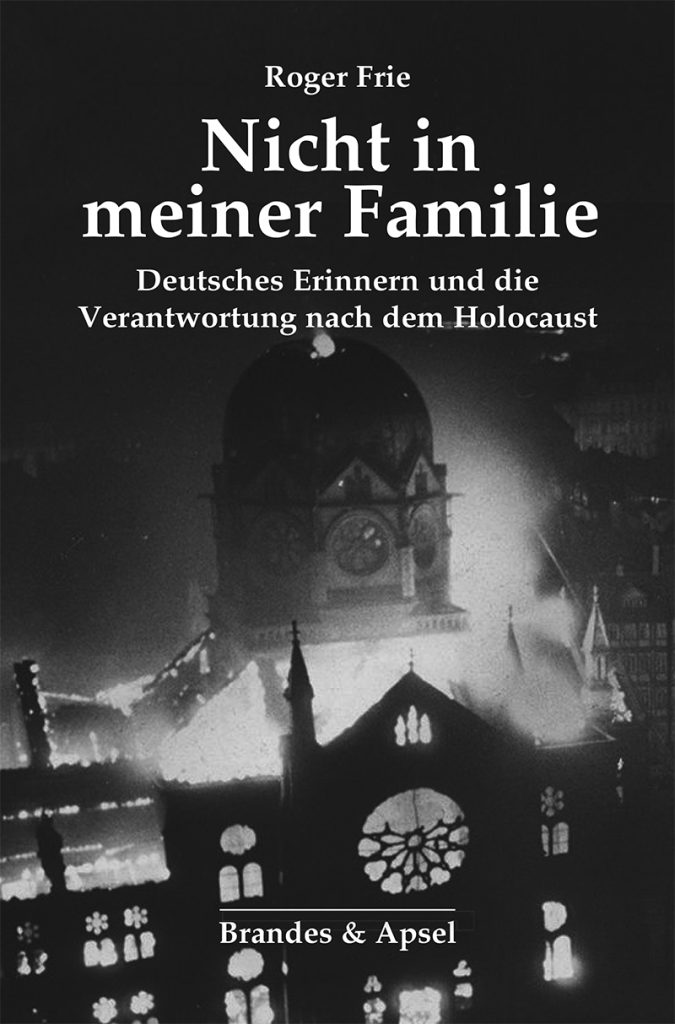
History Flows through Us: Germany, the Holocaust and the Importance of Empathy (Routledge, 2018)
- Finalist for the 2018 Gradiva Book Award
- Finalist for the 2018 American Board & Academy of Psychoanalysis Book Prize
History Flows through Us introduces a new dialogue between leading historians and psychoanalysts and provides essential insights into the nature of historical trauma. The contributors – German historians, historians of the Holocaust and psychoanalysts of different disciplinary backgrounds – address the synergy between history and psychoanalysis in an engaging and accessible manner. In the process, they help us to appreciate the emotional and political legacy of history’s collective crimes. This book illustrates how history and the psyche shape one another and the degree to which history flows through all of us as human beings. Roger Frie has developed an innovative cross-disciplinary approach and enters into an extended dialogue with the historian and psychoanalyst Thomas Kohut. History Flows through Us shows how the fields of history and psychoanalysis are both concerned with the importance of empathy, memory and narrative. This book will appeal to general readers, students and professionals in cultural history, Holocaust and trauma studies, sociology, psychoanalysis, psychotherapy and psychology.
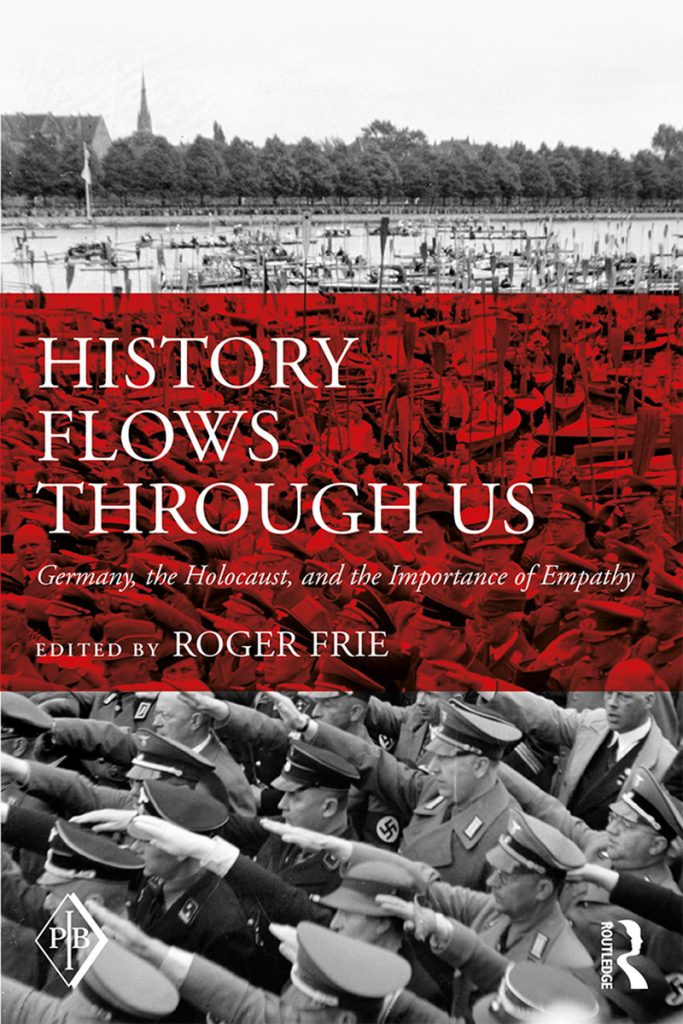
Not in My Family: German Memory and Responsibility after the Holocaust (Oxford University Press, 2017)
- Winner of the 2018 Western Canada Jewish Book Award
- Winner of the 2017 Canadian Jewish Literary Award
- Finalist for the 2018 Vine Book Award for Canadian Jewish Literature
Even as the Holocaust grows more distant with the passing of time, its traumas call out to be known and understood. What is remembered, what has been imparted through German heritage, and what has been forgotten? Can familiar family stories be transformed into an understanding of the Holocaust’s forbidding reality? Author Roger Frie is uniquely positioned to answer these questions. As the son of Germans who were children during World War II, and with grandparents who were participants in the War, he uses the history of his family as a guide to explore the psychological and moral implications of memory against the backdrop of one of humanity’s darkest periods. From his perspective of a life lived across German and Jewish contexts, Frie explores what it means to discover the legacy of a Nazi past. Beginning with the narrative of his grandfather, he shows how the transfer of memory from one German generation to the next keeps the Holocaust at bay. Not in My Family is rich with poignant illustration: Frie beautifully combines his own story with the stories of others, perpetrators and survivors, and the generations that came after. As a practicing psychotherapist he also draws on his own experience of working with patients whose lives have been directly and indirectly shaped by the Holocaust. Throughout, Frie proceeds with a level of frankness and honesty that invites readers to reflect on their own histories and to understand the lasting effects of historical traumas into the present. This book is written for a wide audience and has received multiple distinctions.
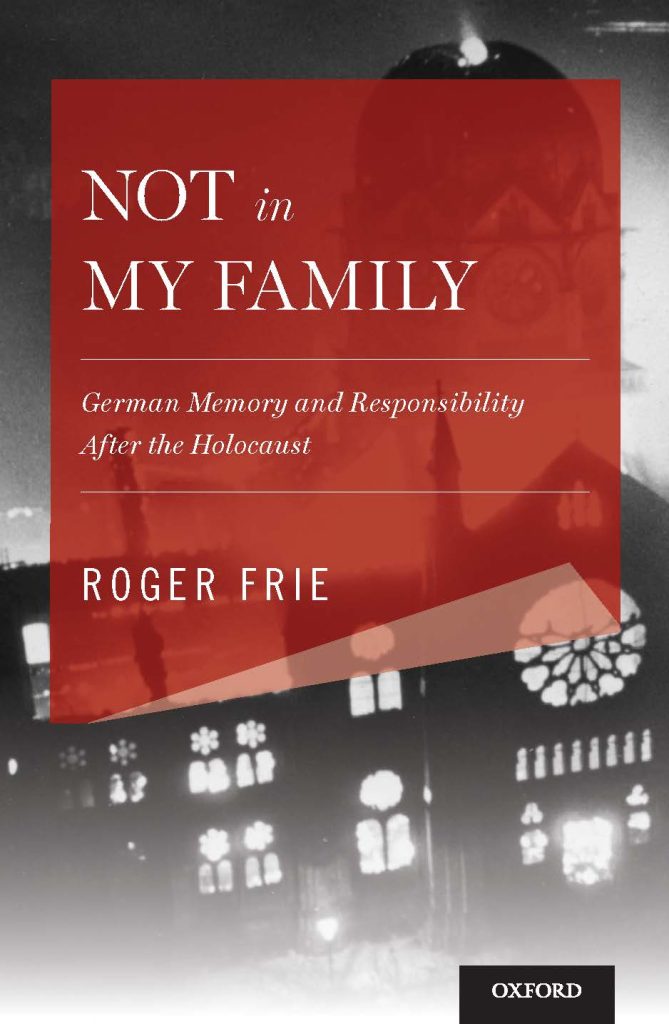
Persons in Context: The Challenge of Individuality in Theory and Practice (Routledge, 2011)
The recognition that we are shaped by our social contexts has led to the development of important new ways of thinking and practicing that dispense with the notion of isolated individuality. From today’s perspective, the question of individuality can sometimes seem confusing, even anachronistic. Yet the challenge of individuality remains an important and pressing issue, especially in societies that are based on individualism. In this volume of original essays, editors, Roger Frie and William Coburn, give the problem of individuality its due, without losing sight of the importance of contextualized experience. Drawing on a variety of disciplinary backgrounds – socio-cultural, philosophical, developmental, biological and neuroscientific – the contributors address the relationship between the experience of being an individual and the social contexts that make us who we are. Persons in Context demonstrates that no matter how it may be defined, individuality always occurs within a contextual web that forms the basis of human experience.
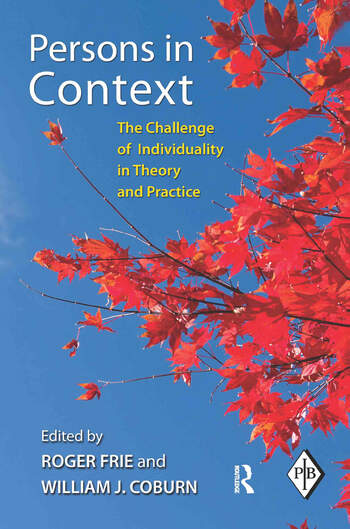
Beyond Postmodernism: New Dimensions in Clinical Theory and Practice (Routledge, 2009)
Beyond Postmodernism identifies ways in which psychoanalysis has moved beyond the postmodern debate and discusses how this can be applied to contemporary practice. The editors, Roger Frie and Donna Orange, bring together many of the leading authorities on psychoanalytic theory and practice to provide a broad scope of psychoanalytic viewpoints and perspectives on the growing interdisciplinary discourse between psychoanalysis, continental philosophy, social theory and the philosophy of mind. Beyond Postmodernism: New Dimensions in Clinical Theory and Practice provides a fresh perspective on the relationship between psychoanalysis and postmodernism and raises new issues for the future. It will be of interest to practicing psychoanalysts and psychologists as well as students interested in psychoanalysis, postmodernism and philosophy.
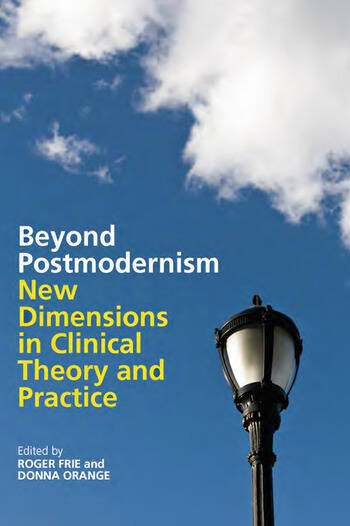
Psychological Agency: Theory, Practice, and Culture (MIT Press, 2008)
This book explores the nature of psychological agency in clinical, developmental, social and cultural contexts. Agency is presented as a central psychological phenomenon that must be accounted for in any explanatory framework for human action. Editor Roger Frie demonstrates that psychological agency is not a fixed entity that conforms to traditional definitions of free will but an affective, embodied, and relational processing of human experience. Agency is dependent on the biological, social, and cultural contexts that inform and shape who we are, yet it also involves the creation of meaning and the capacity for imagining new and different ways of being and acting and cannot be entirely reduced to biology or culture. The generative potential of agency is central to the process of psychotherapy and to psychological change and development. Persons are not only shaped by, but also capable of fashioning and refashioning their contexts in new and meaningful ways. The contributors, who are leaders in their fields, combine theoretical discussion with clinical case illustration.
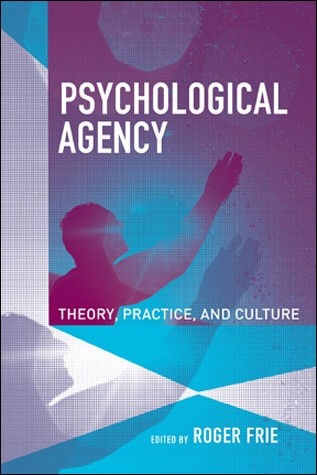
Psychotherapy as a Human Science (Duquense University Press, 2006)
- American Library Association’s “Significant University Press Title for Undergraduates 2006-2007”
A masterful survey, Psychotherapy as a Human Science provides a critical and clinical introduction to the core themes and influential thinkers that helped to shape contemporary approaches to psychotherapy. Authors, Daniel Burston and Roger Frie, present an excellent and concise journey through the historical background that informs the development of psychotherapy, and then proceed to deal with many of the important facets of modern psychology and psychiatry from Dilthey and Husserl to the postmodern. Perennial issues in philosophy–the nature and scope of self-knowledge and self-deception, the roots of inner and interpersonal conflict, the nature of love and reason, the relationship between reason and faith and imagination–took on new depth and meaning in light of 19th and 20th century concepts of the unconscious, alienation, authenticity, alterity and the like. Burston and Frie not only demonstrate that European philosophers laid the foundations for the way many contemporary clinicians think in practice today but provide a theoretical orientation that is too often missing in a medicalized practice environment. This book invites readers to delve deeply into the history and theory of existentialism, phenomenology, psychoanalysis, depth psychology and humanistic psychology. The authors both explore the implications of these approaches for clinical practice and assert the significance of theory for clinical endeavours, encouraging mental health professionals, students and theorists to widen the scope of psychotherapy practice and training.
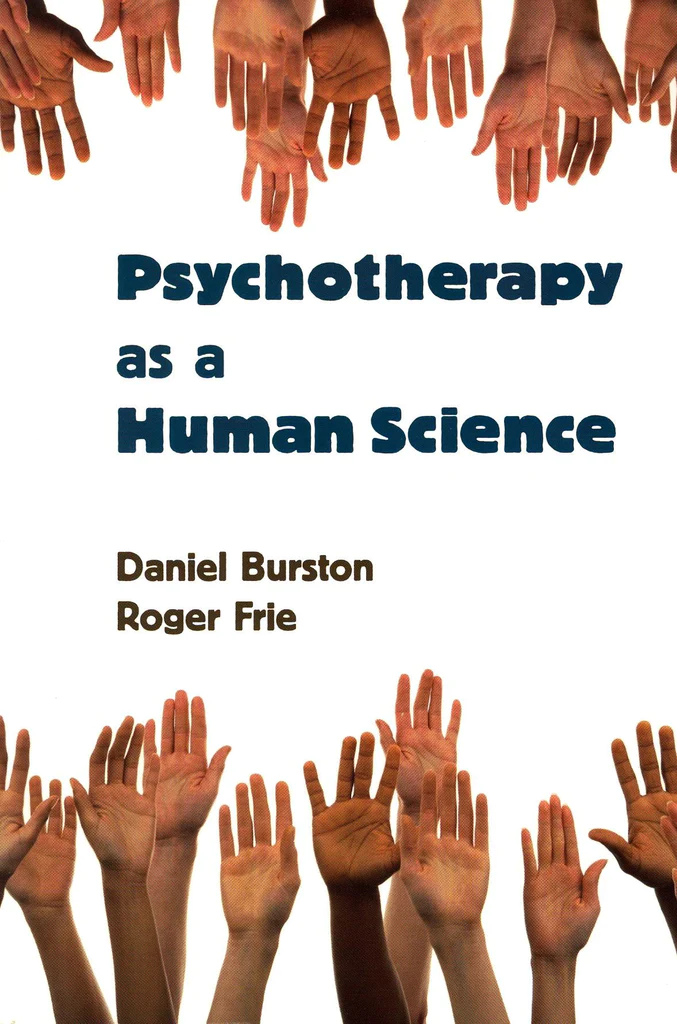
Understanding Experience: Psychotherapy and Postmodernism (Routledge, 2003)
Understanding Experience: Psychotherapy and Postmodernism is a collection of innovative interdisciplinary essays that explore the way we experience and interact with each other and the world around us. The contributors address the postmodern debate in psychotherapy and psychoanalysis through clinical and theoretical discussion and offer an account of the person that draws on the existential and phenomenological tradition. The clinical work of Binswanger, Boss, Fromm, Fromm-Reichmann, Laing, and Lacan is considered alongside the theories of Buber, Heidegger, Husserl, Merleau-Ponty, Sartre and others. Combining insights from psychotherapy and psychoanalysis with European philosophy, this book explores the limits postmodernism and bridges the paradigmatic divide between the behavioural sciences and the human sciences. It will be of interest to clinicians and students of psychotherapy and psychoanalysis who wish to come to terms with the debate over postmodernism, as well as those interested in the interaction of psychoanalysis, philosophy and social theory. Included are original essays by leading experts in existentialism and phenomenology such as Maurice Friedman, Eugene Gendlin and William J. Richardson.
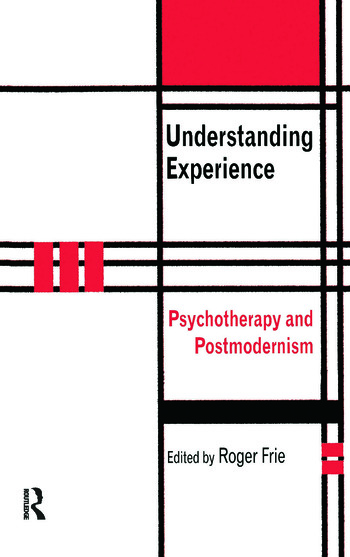
Subjectivity and Intersubjectivity in Philosophy and Psychoanalysis: A Study of Sartre, Binswanger, Lacan, and Habermas (Bloomsbury / Rowman and Littlefield, 1997)
This innovative and wide-ranging book provides an essential guide for understanding the topic of intersubjectivity. Author Roger Frie develops a critical account of how leading philosophers and psychoanalysts have addressed what it means to be both a unique person and a fundamentally social being. Using a line of analysis strongly grounded in the European tradition, Frie examines the complex relationship between subjectivity, intersubjectivity, language and love in a diverse body of theories. He provides lucid interpretations of the work of Sartre, Binswanger, Lacan, Habermas, Freud, Buber, Husserl and Heidegger, amongst others, and draws important connections to feminist thinkers on the theme of human interaction. Because of its cross-disciplinary nature, Subjectivity and Intersubjectivity in Philosophy and Psychoanalysis will appeal to a wide audience in the areas of continental philosophy, psychoanalysis, and social theory.
